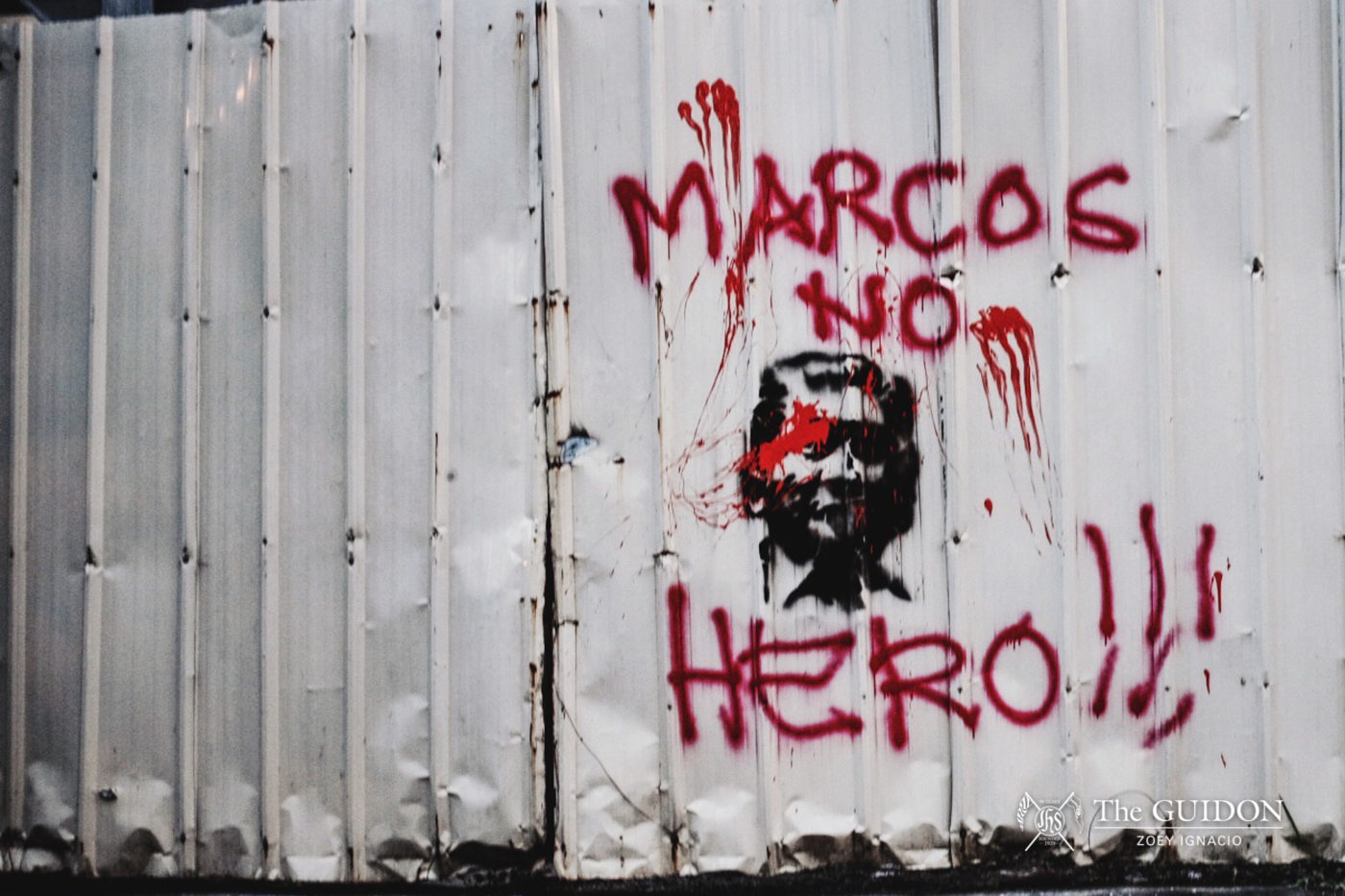“Last September 21, Filipinos mark the 47th anniversary of the declaration of Martial Law under former President Ferdinand Marcos. What can we learn from this part of our history?”
“History, especially political history, is highly subjective and prone to influence and revision. Because of this, we as individuals must be objective and make a point of being aware of past and present realities. Accountability is enforced by this awareness; we citizens are responsible for our collective choice and action and holding accountable those we put in power. Recognize the times when the balance between the people and the state is disturbed. It is history repeating itself.
In the 70s, it was the youth who opposed the Marcos dictatorship. Now, 47 years later, we are pushed to fill the shoes of those who came before.”
Adriana Quimpo Chiu
1 AB POS
“Time, as well [as] Philippine governance, make it easy to forget that the declaration of Martial Law [led] to some of the darkest and most horrific moments in Philippine history. However, these horrific stories have to be told over and over again until we learn that freedom is our most precious heritage and the freedom we have now came at the expense of people who lie in unmarked graves.”
Sophie Co
2 BS HS
“Numerous atrocities have been committed by the government in order for Ferdinand Marcos to stay in power. These atrocities have then sparked courage in the hearts of our countrymen to stand up against the regime instead of cowering in fear. Today, countless Filipinos are standing up against another person in power. We protest, write articles, rally, and even spread awareness about the tyranny of our current government. We learned to fight back. All the inhumane and unacceptable actions committed by the government aren’t ignored. We criticize the government and are not afraid to speak up against the mistakes of the government. What we learned and what we can learn from this part of history is that there will always be a ruler or a leader who will lead a country into the abyss. But at the same time, there will always be people who will fight for what’s right, and that our power and will as united citizens can achieve great things.”
Matthew Sagupay
2 BS LM
“Just because Martial Law is done [it] does not mean the fight is over. The wounds caused by the iron fist should never be forgotten, even after 47 years. I’ve learned that even if our generation did not experience it firsthand, we must stand as strong, if not stronger, [than] our parents and grandparents did.”
Rhane Luciano
3 BSM AMF
“We can learn that having to fight for human rights shouldn’t be a thing. Human rights must never be perverted in any way as [they] had been during that part of Philippine history.”
Aljohn Josef Austria
2 AB EU
“History is something we must remember as stories about Martial Law are still being told through the years. Atrocities committed at that time [would still be] swept under the rug if not for the firsthand accounts, documentaries, and literature we have now. We tend to forget how difficult it was to speak your mind then, and a lot of today’s youth aren’t accurately informed about what happened during Martial Law under Marcos. Anyone who spoke against the government disappeared, including students and journalists. It’s easy to take our freedom of speech for granted. Despite not being born in that period, Filipinos should be more sensitive and engage in open discussions and not be quieted into a state of indifference.”
Meg Genuino
3 AB COM
“In general, thinking critically is difficult to maintain, but it was especially difficult in those times. We must never forget to take a second to think about the information being given to us.”
Bryan Ferrer
2 BS ECE
“After 47 years since the declaration of Martial Law in the country, we Filipinos have learned to be more united and resilient as one country. In this modern day and age wherein Filipinos are more involved with politics and the government, we must not remain silent and oppressed. Instead, we should continue to fight for what we believe is right both for us and the entire nation.”
Meldrick Tin
1 BS CTM
“It’s a concrete proof and reminder that the people can be a force to be reckoned with if only we unite. Alone, one’s voice would drown in the sea of whatever the majority decides it wants to talk about at the moment. It can easily be silenced in a snap. When we see that injustice is happening and [when] we realize this [and] express our dissent together, that voice becomes so much louder.
This is especially more relevant now in times when activism and disagreeing with the government almost automatically gets one labeled as a terrorist—and that’s if you’re lucky. I think it’s high time people also learn not to overlook crimes against humanity just because the government seems to be making the progress it wants. We have to understand that it’s not a matter of being pro or anti-government; it’s about being pro-Filipino.”
Maria Victoria Tenido
1 BS MIS-MSCS
“We learn that the fight doesn’t end when the victory is won. Martial Law left a stain in our history, our culture, our bloodline, and who we are as Filipinos. We need to continue the fight and that doesn’t mean removing the stain. Rather, we educate ourselves how to avoid these stains and prevent the memory from being lost in future generations.”
Josh Isleta
2 AB Dip IR
“We Filipinos should fight and stand up for our freedom and democracy when we are being oppressed. We must bear in our minds and hearts the devastating events that took place during Martial Law as it serves as a reminder that we can always unite as a nation and get through the dark days.”
Czarina Recalde
1 BS CTM
“I’m sure many were afraid when Martial Law was declared back in 1972. In such tumultuous times, we ask ourselves what’s going to happen and since we don’t know the answer to that question, we become paralyzed by fear.
But the Filipinos of that generation had more than fear—they had hope. They asked themselves what they want to happen for their nation and their countrymen. They knew their answer, so they set off to make it a reality.”
Terence Villalon
3 BS ME
“Martial Law was declared due to political unrest to achieve order and security. But what it achieved instead was the unrest of the people, the civilians. With the power solely in the hands of Ferdinand Marcos, people were bound to be scared for themselves and for their country. I guess what we can learn from this part of our history is that there is always a reason behind an action. The former President saw it fit to [implement] Martial Law because of the opposition and rallies against the government that also affected civilian lives. Martial Law was supposed to be a solution [to] chaos. What was wrong about it was the mistreatment of the people who were tortured and jailed. What was also wrong were the attacks of the activists against the people of their own country. They should be able to express their disagreements, but they should not resort to violence and mistreatment of others. There are always two sides to a story. Both sides had reasons for their actions, but both had faults in their actions, too.”
Hannah Zhuang
1 BS CTM




